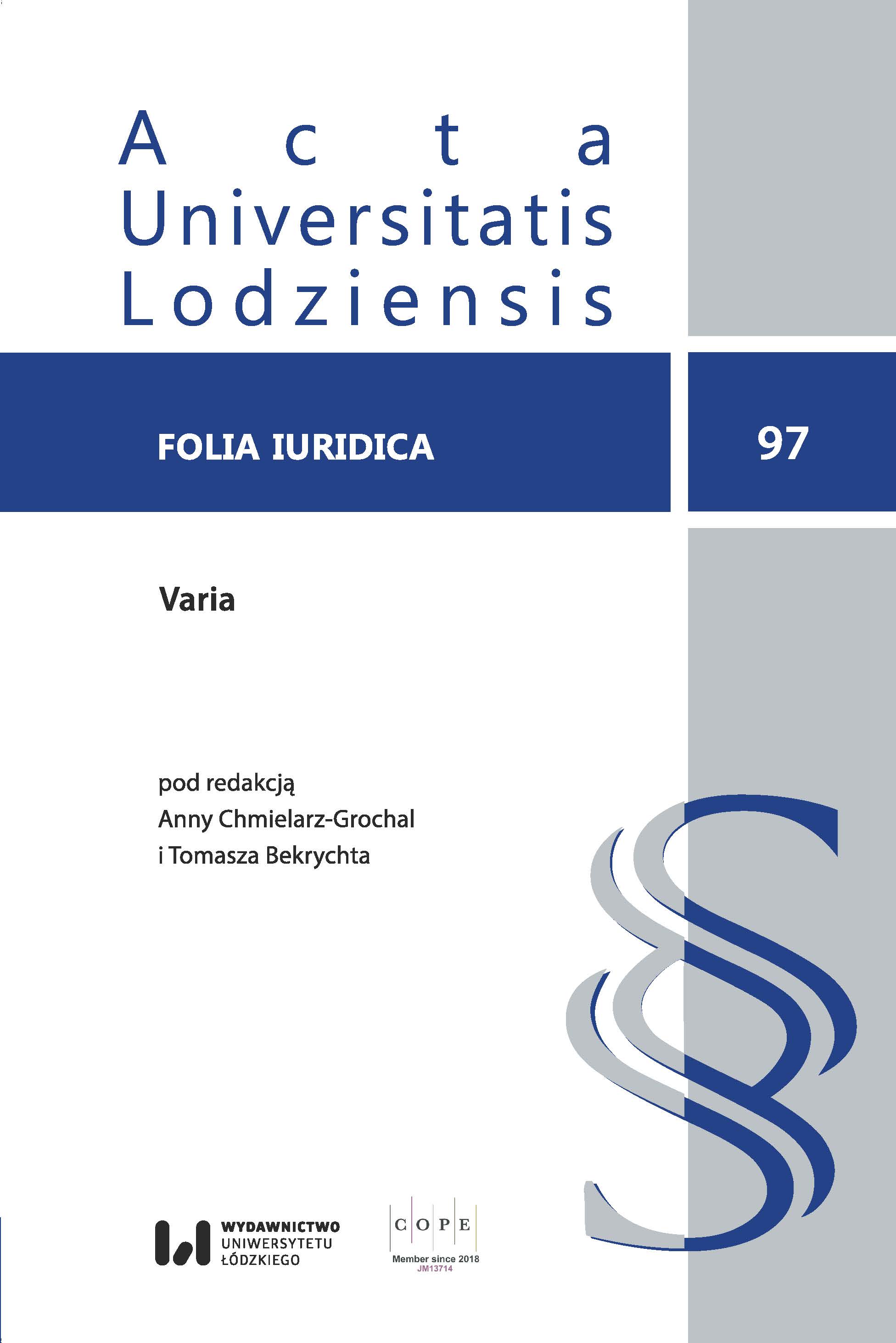Three levels of conclusiveness of legal argumentation
DOI:
https://doi.org/10.18778/0208-6069.97.14Keywords:
legal theory, legal argumentation, interpretative paradigm, conclusiveness of interpretation, application of lawAbstract
Article presents three analytical perspectives of the problem of closing legal argumentation against the background of the central interpretative assumptions of two leading Polish theories of interpretation, i.e. the clarificative and derivational concept. Author presents thesis that the ability of operative interpretation to regulate social relations is, inter alia, the resultant of conclusiveness of a given interpretative paradigm and the cultural context in which it is embedded. Regardless of the validation of the result of interpretation in the legal discourse, i.e. in the environment of professionals, it is possible that the directives of interpretation, which constitute a cultural artifact, are not fully compatible with the ideological and axiological assumptions of the legal and political culture of a given society, constituting a counter-productive element of that culture.
Downloads
References
Albert, Hans. 1995. „Pewność czy prawda?” W Kierunki filozofii współczesnej. Cz. I. Red. Józef Pawlak. Tłum. Ija Lazari-Pawłowska. 251–260. Toruń: Wydawnictwo Uniwersytetu Mikołaja Kopernika.
Google Scholar
Bator, Andrzej. 2006. „Wspólnota kulturowa jako element integracji prawa”. W Z zagadnień teorii i filozofii prawa. W poszukiwaniu podstaw prawa. Red. Adam Sulikowski. 11–30. Wrocław: Wydawnictwo Uniwersytetu Wrocławskiego.
Google Scholar
Bauman, Zygmunt. 1987. Legislators and Interpreters: On Modernity, Post-modernity and Intellectuals. Oxford: Polity Press.
Google Scholar
Bogucki, Olgierd. 2020. “The Derivational Theory of Legal Interpretation in Polish Legal Theory”. International Journal for the Semiotics of Law – Revue internationale de Sémiotique juridique 33: 617–636.
Google Scholar
DOI: https://doi.org/10.1007/s11196-019-09628-1
Cossio, Carlos. 2014. “Phenomenology of the decision”. W Latin-American Legal Philosophy. Luis Recasens Siches, Carlos Cossio, Juan Llambias de Azevedo, Eduardo Garcia Maynez. 343– 400. Cambridge, Massachusetts: Harvard University Press (reprint).
Google Scholar
Davis, Michael Henry. 1987. “A Government By Judges: An Historical Re-View”. American Journal of Comparative Law 35: 559–580.
Google Scholar
DOI: https://doi.org/10.2307/840481
Dyrda, Adam. Tomasz Gizbert-Studnicki. 2020. „Granice sporów interpretacyjnych w prawoznawstwie”. Archiwum Filozofii Prawa i Filozofii Społecznej 2: 19–34.
Google Scholar
DOI: https://doi.org/10.36280/AFPiFS.2020.2.19
Grabowski, Andrzej. 2015. “Clara non sunt interpretanda vs. omnia sunt interpretanda: A neverending controversy in Polish legal theory?”. Revus – Journal for Constitutional Theory and Philosophy of Law 27: 67–97.
Google Scholar
DOI: https://doi.org/10.4000/revus.3326
Grzybowski, Tomasz. 2012. „Spory wokół zasady clara non sunt interpretanda”. Państwo i Prawo 9: 44–56.
Google Scholar
Grzybowski, Tomasz. 2013. „Jednolitość orzecznictwa a paradygmat interpretacyjny (ze szczególnym uwzględnieniem reguły clara non sunt interpretanda)”. Archiwum Filozofii Prawa i Filozofii Społecznej 2: 25–37.
Google Scholar
Grzybowski, Tomasz. 2015. „Interpretacyjny park jurajski: odpowiedź Agnieszce Choduń”. Archiwum Filozofii Prawa i Filozofii Społecznej 2: 142–148.
Google Scholar
Grzybowski, Tomasz. 2018. “Effectiveness of interpretation in the context of Polish theories of legal interpretation”. W Mind the Gaps. Economical Aspects in the Legal Thinking. Red. Tomasz Bekrycht, Sergiy Glibko, Bartosz Wojciechowski. 209–221. Łódź: Wydawnictwo Uniwersytetu Łódzkiego.
Google Scholar
Hart, Herbert L.A. 1998. Pojęcie prawa. Warszawa: Wydawnictwo Naukowe PWN.
Google Scholar
Jabłoński, Paweł. Przemysław Kaczmarek. 2013. „O trzech granicach władzy prawniczej”. Archiwum Filozofii Prawa i Filozofii Społecznej 1: 93–108.
Google Scholar
Kozak, Artur. 1999. „Prawoznawstwo pomiędzy techne a episteme. Uwagi w związku z pracą M. Zirk-Sadowskiego Prawo a uczestniczenie w kulturze”. Ruch Prawniczy, Ekonomiczny i Socjologiczny 3–4: 269–278.
Google Scholar
Lucy, William. 2002. “Adjudication”. W The Oxford Handbook of Jurisprudence and Philosophy of Law. Red. Jules L. Coleman, Kenneth E. Himma, Scott J. Shapiro. 206–267. Oxford: Oxford University Press.
Google Scholar
Morawski, Lech. 2010. Zasady wykładni prawa. Toruń: TNOiK – Towarzystwo Naukowe Organizacji i Kierowania. „Dom Organizatora”.
Google Scholar
Nonet, Phillipe. Philip Selznick. 1978. Law and Society in Transition. Towards Responsive Law. New York: Harper Colophon Books.
Google Scholar
Perelman, Chaim. Lucie Olbrechts-Tyteca. 1991. The New Rhetoric: A Treatise on Argumentation. Notre Dame: University of Notre Dame Press.
Google Scholar
Safjan, Marek. 2010. “The Universalisation of Legal Interpretation”. W Interpretation of Law in the Global World: From Particularism to a Universal Approach. Red. Joanna Jemielniak, Przemysław Miklasiewicz. 107–124. Berlin–Heidelberg: Springer.
Google Scholar
DOI: https://doi.org/10.1007/978-3-642-04886-9_6
Stelmach, Jerzy. 2010. „Przypadek trudny w prawie”. W W poszukiwaniu dobra wspólnego. Księga jubileuszowa Profesora Macieja Zielińskiego. Red. Agnieszka Choduń, Stanisław Czepita. 141–150, Szczecin: Wydawnictwo Uniwersytetu Szczecińskiego.
Google Scholar
Wittgenstein, Ludwig. 1972. Dociekania filozoficzne. Tłum. B. Wolniewicz. Warszawa: Państwowe Wydawnictwo Naukowe.
Google Scholar
Wróblewski, Jerzy. 1973. Wartości a decyzja sądowa. Wrocław: Zakład Narodowy im. Ossolińskich.
Google Scholar
Wróblewski, Jerzy. 1987. “An outline of a general theory of legal interpretation and constitutional interpretation”. Acta Universitatis Lodziensis. Folia Iuridica 32: 33–89.
Google Scholar
Wróblewski, Jerzy. 1988. „Poziomy uzasadnienia decyzji prawnej”. Studia Prawno-Ekonomiczne XL: 17–33.
Google Scholar
Zieliński, Maciej. 2010. Wykładnia prawa. Zasady, reguły, wskazówki. Warszawa: LexisNexis.
Google Scholar
Zieliński, Maciej. Marek Zirk-Sadowski. 2011. „Klaryfikacyjność i derywacyjność w integrowaniu polskich teorii wykładni prawa”. Ruch Prawniczy, Ekonomiczny i Socjologiczny 2: 99–111.
Google Scholar
Zirk-Sadowski, Marek. 1984. Rozumienie ocen w języku prawnym. Łódź: Wydawnictwo Uniwersytetu Łódzkiego.
Google Scholar
Zirk-Sadowski, Marek. 1997. “Institutional and Cultural Dimensions of Legal Interpretation”. Studia Prawno-Europejskie 2: 7–18.
Google Scholar
Zirk-Sadowski, Marek. 2006. „Epistemologia prawa a teorie wykładni”. W Prawo – Władza – Społeczeństwo – Polityka. Księga Jubileuszowa Profesora Krzysztofa Pałeckiego. Red. Maria Borucka-Arctowa. 67–78. Toruń: Wydawnictwo Adam Marszałek.
Google Scholar
Zirk-Sadowski, Marek. 2012. „Pojęcie, koncepcje i przebieg wykładni prawa administracyjnego”. W System prawa administracyjnego. Red. Roman Hauser, Zygmunt Niewiadomski, Andrzej Wróbel. T. 4. Wykładnia w prawie administracyjnym. 131–188. Warszawa: C.H. Beck.
Google Scholar
Wyrok TK z 6.09.2001 r., P 3/01, OTK 2001/6/163.
Google Scholar
Downloads
Published
How to Cite
Issue
Section
License

This work is licensed under a Creative Commons Attribution-NonCommercial-NoDerivatives 4.0 International License.














